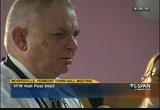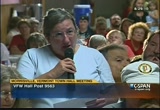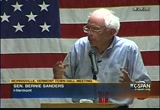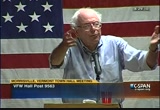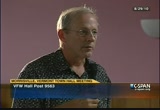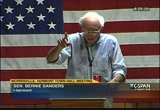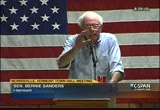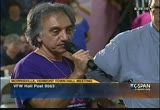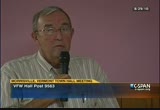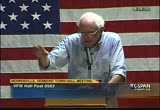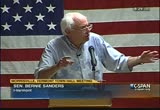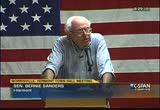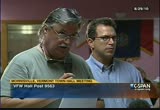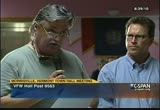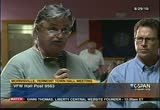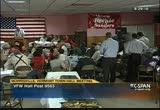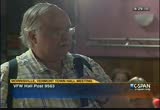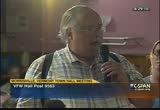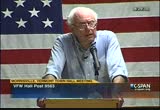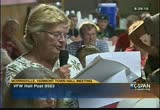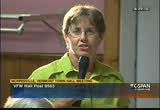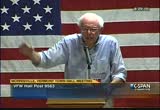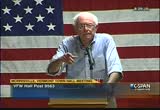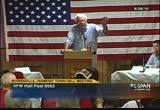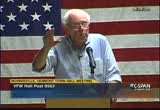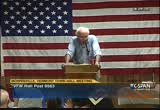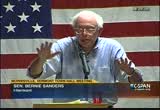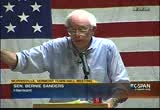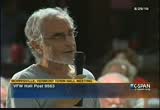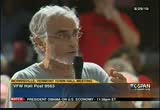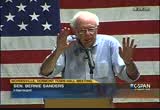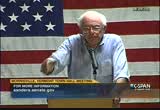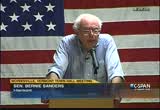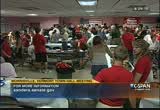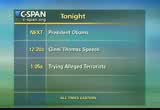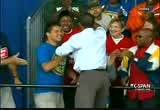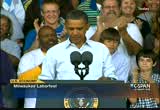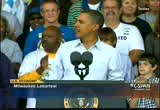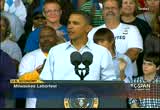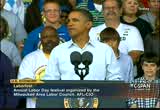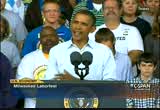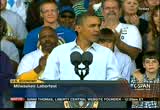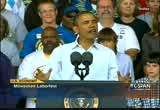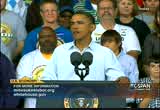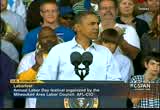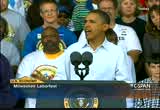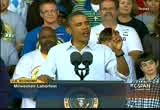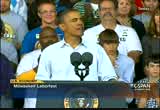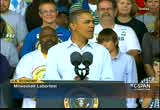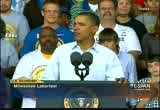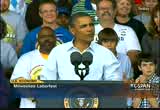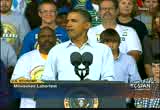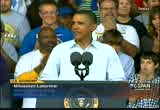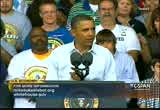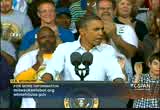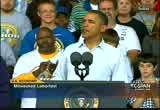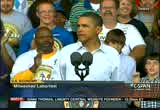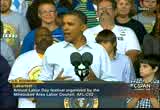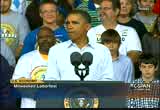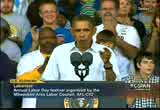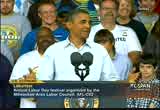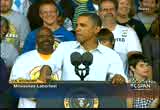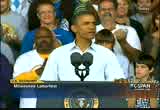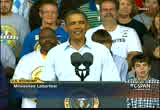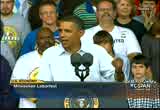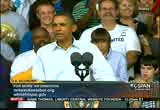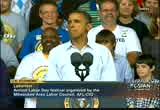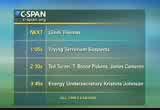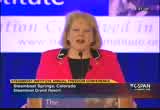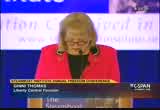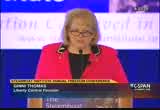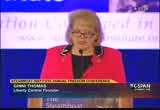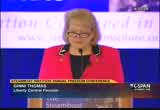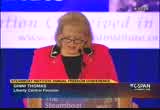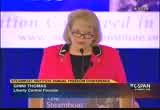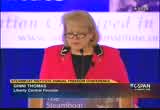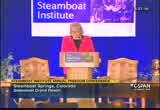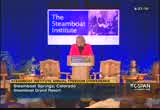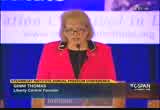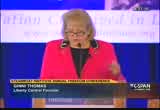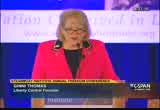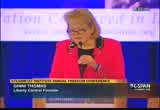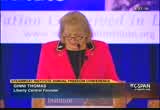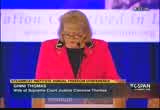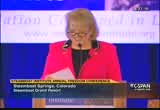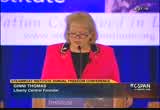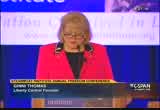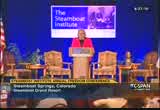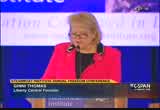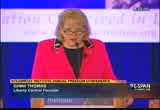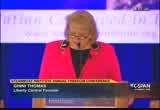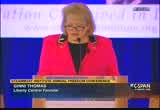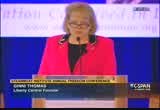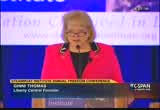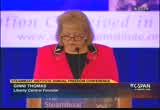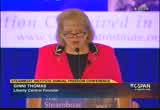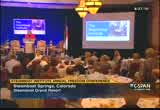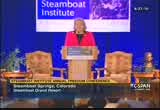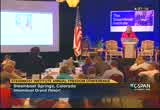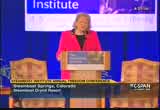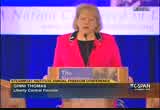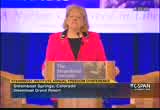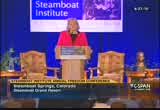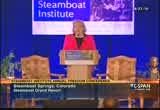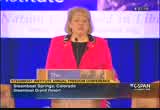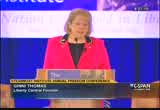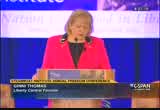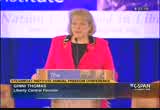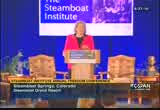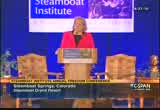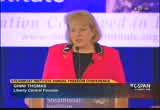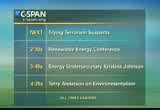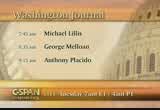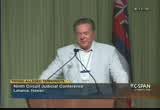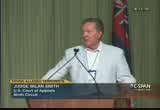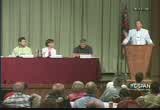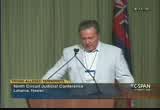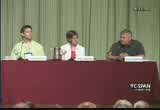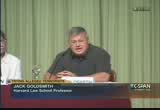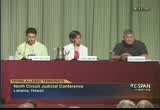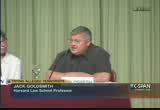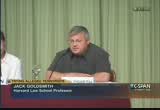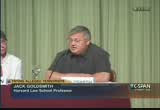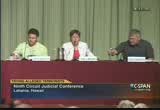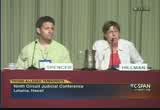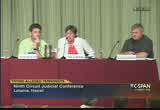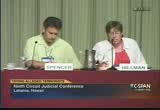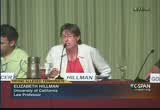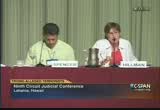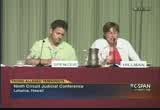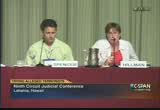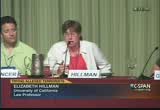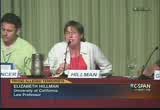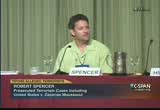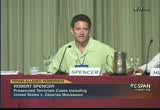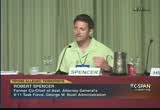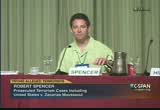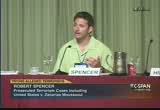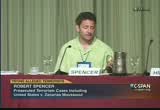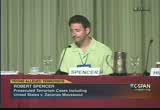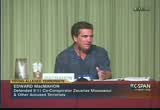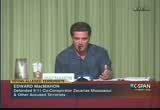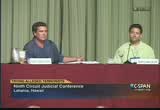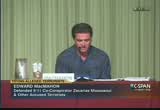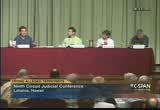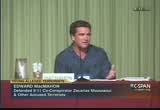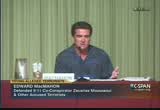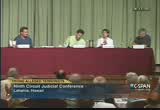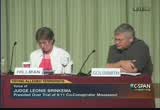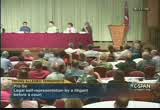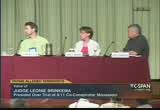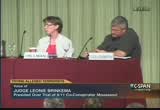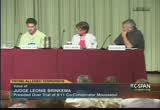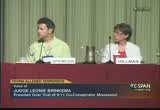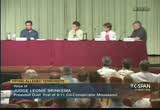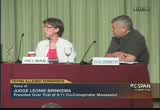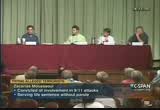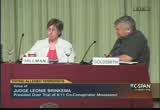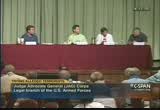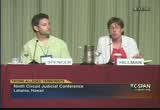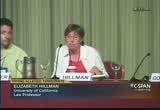tv Capital News Today CSPAN September 6, 2010 11:00pm-2:00am EDT
11:00 pm
11:01 pm
>> i have a question, why do the majority of jobs in vermont go to people outside of vermont? i worked in a resort town and our construction workers were from canada, massachusetts, new york, international students running the hotels. >> on one part of that issue, we are a nation, and vermonters, i know are working in massachusetts and connecticut and that's what happens. contractors get a job and bring
11:02 pm
in their own people. i will tell you an issue we have with that that does concern me very much. immigration in this couldn't vi a serious issue and we have to deal with it in a comprehensive way. i voted against the immigration bill that came up last time primarily for one reason. you touched on that reason. we have programs called guest workers programs. guest workers programs are, a company says, we need a certain type of employee. and we can't find that employee in the united states. therefore we have to go to warsaw or someplace else. high tech companies use this for engineers and scientists. resort areas use it for a variety of reasons. you will be shocked to know, some years ago, here in the state of vermont, apparently we do not have people who can be ski instructors. did you know that?
11:03 pm
we just don't have enough people in the state of vermont who know anything about skiing and can instruct. therefore, correct me if i'm wrong, we have to bring people from all over the world to be sky skee instructors. those programs, those guest worker programs are often exploited by employers. why do they do that? they can bring people from abroad, young students -- students and pay them less than they would american workers. we fought that. we're making a little bit of progress in saying, especially in the middle of an -- of a recession, for example, exxonmobil needed welders and they brought in welders from india to do welding in the united states because obviously we don't have anybody in america capable of welding. totally absurd. so what we need is if a company
11:04 pm
really, really can't find somebody for a specified, particular job, that's fine. i don't have a problem with that. but i think there are a lot of american workers out there who are more than capable of doing the work and they should be hired in this country first. ok a few more questions. >> good evening, senator. i'm director of the memorial stanley center. i think you're aware there's a crisis in child care brewing, not only in vermont but across the country. we have about 94 programs of which 38 are licensed centers and 56 are registered homes, meeting about 75% of the actual need in this community. in the last 12, 14 months aloan we lost two licensed centers, one an accredited program, up to as many as 66 slots that had been available here in war sew and johnson and the number of
11:05 pm
registered homes dropped from 65 to 56 in about the same amount of time. we need your help. >> you'll have my help. you'll continue to have my help. you do a great job there. i don't want to get into the parent child centers, they do a fantastic job. they deal with low-income people in a holistic way, it's literacy, child care, parenting skill, they do it under one roof in a warm and human way. we have done our best to bring in money for them. if you ask me about one of the midge issues as a nation we don't talk about, it is child care. a couple of years ago, somebody i was talking -- i was talking to a group with a staff person who did some research for me. they gave me some notes and said, here's the notice. 80% of the women in the state of vermont who have kids under 5 go to work. don't be ridiculous, go back
11:06 pm
and check again. it was something like that. so all kinds of -- for all kinds of obvious reasons, especially in the midst of a recession, most of the families you know in the middle class, it's not daddy going out to work and the mom staying home with the kids, they both have to work. the question is who is taking care of the kids? and the answer is, right now, our child care situation is dismal. all over the country, it is difficult for working families to find good quality, affordable child care. what happens if you don't find good quality child care, what happens to a kid? a kid gets dumped into someplace and spends his or her days watching television and by the time they get to kindergarten or first grade, they're behind other kids and 10 years later, they're dropping out of school. i think we need to fundamentally rethink child care. god didn't create school
11:07 pm
starting at 5 or 6. we have to recognize this is a different economy than 50 years ago and men and women are both working, parents are entitled to quality, affordable child care. that's good for the families, that's good for the country. [applause] >> i'm a traveling musician. i'd like to congratulate you on your incredible focus on these issues. you realy know what you are saying, well researched and you understand all of these. i want to speak specifically on one issue. i just came back from china and this idea of what is going on in china and what america is throwing away, literally, just tying it in to -- the world is actually supporting the -- it's not against anyone. i think one should be self-supportive. there's probably more oil in
11:08 pm
this country than the rest of the world. and you know that. but for different reasons it's not being used. you know more about this than i do. but the idea of the offshore manufacturing that is now backfiring, it's backfiring on purpose because of the issue of the -- of economics. the corporations against the small guy. so all the -- naturally all the employment is going over there but the energy consumption, the energy technology that is being developed over there, you have no idea what is going on. 1.6 billion people -- and 3% or 4% are owning cars, they're the second biggest market in the world. this idea of trying to turn it around is the single most important challenge, i think, like building in america, making it here so we can sustain it and the creating
11:09 pm
jobs, it's all tied. in they get it and you're on it. >> ok. thank you. >> a strong economy with good jobs depends upon an efficient and effective education system. [applause] you need to get politics in washington to -- out of the school room. trust your teachers and face -- and have faith in the education professions. i'm curious how you would feel about repealing no child left behind because it doesn't work and it's too expensive. [applause] i would go even a step further and abolish the united states
11:10 pm
department of education and put the schoolhouses back under our jurisdiction and our responsibility. thank you. [applause] 4 >> i heard about half of your statement. the no child left behind program is no longer called no child left behind. we got rid of the name. i hope we get rid of a lot of ideas we incorporated in no child left behind. in terms of education, you're absolutely right. how are we going to be competitive in a global economy if we don't have an extremely well educated work force? let me just say a couple of things. first of all, as a nation, you have to ask yourself, do we really respect education? do we respect educators? do we think intellectual pursuit is really something that is an important calling? i think if you think about it,
11:11 pm
we don't. you turn on the television and see all that stuff on television, it's not really appealing to people's intelligence. you know. so what we have to do first of all is say that the intellect and getting our young people to study and to work hard is important. it's a goal. there are kids out there who are bright, who are curious, who want to do well in school you know what, they're afraid to do it because their friends will think they're nerds. can you imagine that? [applause] so we have got to say, sure we want kids to be great football and basketball players but we also want them to be great scientists and engineers as well. [applause] that's number one. number two. and here's something we should be -- i know i laid out a lot of problems but here's another one. for many, many year the united states led the world, we were number one in terms of the percentage of our young people
11:12 pm
graduating high school and going to college. we were number one. you know where we are today? 12th. we're 12th and moving down the ladder. so there are a lot of reasons for that. many middle class families can't afford to pay $40,000 or $50,000 for a college education, turning off a lot of young people. we are seeing nationally 30% of our kids dropping out of high school. what do you think a kid who drops out of high school today does? do you think that kid in most cases will be hired? i don't think so. we have to reform a lot of things. i'm proud to say, and everybody in this room should be proud to say that the state of vermont is probably top in the country in terms of our public schools. we have the highest graduation rate of any state in the country. we have kids at the fourth grade, sixth grade, whose reading and math skills are way up there at the top. it is very easy to be critical
11:13 pm
of teachers and schools. s the easiest thing in the world. but i think we should be proud of what's going on in vermont. i think we have to understand the importance of education, not frontal a human point of view, personal point of view but from an economic point of view in a competitive economy. >> first of all, i'd like to thank you for your assistance two years ago when i was on the board of directors of the veterans place in helping us receive $775,000 from the veterans administration to build housing for 26 homeless veterans. [applause] secondly, i'd like to tell you that last year, i was honored to bring andrew parker owen here in this local community, i was on the committee that had the parade and we raised $200,000 for him.
11:14 pm
now how was i able to do that? 11 years ago, my wife had a traumatic injury. so we lost everything we had. and i became her full-time caregiverer. she had two brain jurgeries. -- surgeries. for eight years she's been receiving disability medicare. she's been receiving medication this year, her medication was denied. it was denied by an organization called maximus. i am her caregiver and i -- i apologize. i have to appeal for her. now this is a letter we got from maximus and i'm going to read who maximus. is we are maximus, federal services. we are experts on appeals.
11:15 pm
medicare hired us to review this file and decide if the part d plan made the correct decision. we work for medicare. we do not work for part d plan. we appealed and my wife won wholly through the administrative law judge process. maximus appealed that decision. this is what they say. according to the term medically accepted indication, includes only f.d.a. approved uses and those offlabel uses supported by citeation and one of the listed drug -- in one of the listed drugs compendia. medically accepted indication does not include treating physician testimony or proffer of medical records showing a drug as prescribed effectively treats the condition for which it is being used. congress easily could have included physician expert
11:16 pm
testimony and medical records as source material for determining medically accepted uses if it had wanted to do so. instead, congress chose to define a medically accepted use by reference to a drug's f.d.a. label and objective, expert evidence contained in one of several listed drug compendaia. >> let me stop you. we work on issues like that. so we could be of help to you. >> senator, thank you very much for your time. [applause] >> by the way, i should have mentioned, we have a number of excellent caseworkers in burlington, they havemened many, many thousands of vermonters on many issues. so if you know of anybody who you think could use our help,
11:17 pm
don't hesitate to have them give us a ring. >> for the past six years, i've been a high school science teacher in richford. i'd like to disagree with some of the things the gentleman said about education on this side of the room earlier. it's certainly true that the future economic competitiveness of our country depends upon a good educational system. i wish i could tell you that i thought that the quality of the education we're giving to our students in vermont is doing well, as you suggest. it's not been my experience in the last six years, however, that that's the case my school is a small one and we have about 250 students. in the last six years i've been teaching there, i feel that academic performance has been going down. i think this is a trend that teachers who have been there longer than me say has been going on for longer. with schedule change to how we run our school two years ago, there was a dramatic dropoff in
11:18 pm
performance. teachers, administrators and the school board not interested in listening to the data on how the students are doing. as an educator for the past six years and prior to that, i was an engineer at i.b.m. for 23 years, i need to tell you that people in any group, including this group of teachers i work with, 30 people, they're all decent people, all well-intentioned. however, like all people, they respond to how they're measured. in fact, i could not get anyone in the last two years interested in dealing with the problems our schedule change created. i think we need an educational system where teachers are measured based upon the performance of their students through student test scores or some other measurable method. because if we were a business with no emphasis on quality at the school district -- as the school district i've been working in appeared to be, we would fail as a business. i'd like to support the idea of
11:19 pm
the race to the top that duncan and the obama administration is pursuing. i think it's embarrassing that the state of vermont education department is not choosing to try some ideas in educational reform. we are not headed in the right direction and i have six years of personal experience to prove it. [applause] >> my concern is the way our health care institutions operate. how is socialized medicine any different than our united states system when people have to wait for months to even get a consultation appointment with a surgeon and wait even longer to get the procedure done. people have to resort to going to the e.r. in late hours only
11:20 pm
to be told that it has to be a life or death situation to be admitted. who determines the criteria for authorization? the insurance company? when a person -- is it any wonder that our society has become so drug dependent? shame on our government that allows this heinous treatment. insurance companies are dictating to our doctors how they can care for people's health. thank you. [applause] >> my name is rachel gussie, i want to thank you for your comments about education and the need for curiosity and what
11:21 pm
needs top in our country. i wanted to ask you to speak a bit about funding. federal funding and what you're aware of and what's going on in the state. but i have to pause and just respond to the gentleman who teaches in richford. i'm fortunate to teach at people's academy with a staff that, i think, may be different than yours where people choose to take on professional development and i'm very concerned about some of your ideas for measurement of teachers. >> let me just -- let me just say a word about education. we were at a meeting this morning and a teacher said how upset they were to have a budget meeting in town, there were people ripping into teachers and the schools and she felt the kids were picking
11:22 pm
up these vibes and it was very awkward and bad seeing their own teachers being attacked. what we have in this state and in many parts of this country is a very regressive and unfair way of funding education. what do i mean by that? if you have a town like morrisville or virtually any tound in the state where people don't have a lot of money, you're an old person living in a house and your property taxes are going up. somebody comes forward and says, you know, we need a 10% increase in the school budget. what are you going to stay? -- say? are you anti-kid, anti-snegs no you're not. you don't have the money. what you see in community after community, you see people coming at logger heads with each other, good people. you see the teachers and parents saying, our kids need a good education. older people, the working people, say irk can't afford higher property taxes. what's the answer?
11:23 pm
the answer is we've got to break our dependency on the property tax. we need -- [applause] our schools need to be run in a cost effective way, i'm not suggesting we just throw money of the -- at the schools, they need to be run effectively. but we should not be splitting our communities apart because people in bad economic conditions are forced to vote against higher property taxes. >> my name is jordan, i'm a johnson state college student, i wanted to ask what -- what steps have you taken and what steps are you planning to take to help college students? i'm a full-time student, i take 18 credits, i know i'm from out of state, but in-state too, i don't know if anybody has a college student at johnson state but it's outrageously expensive and the burden that
11:24 pm
students and their parents have to take on is outrageous and we're lose manager and more grants every year. >> jordan, let me ask you a question. if you lived in germany, if you lived in finland do you think you'd be better off? >> many people around the world see the education of our young people as an investment in the future. as an investment in the future. and i agree with that. i think college should be available to every family in this country regardless of their income. i think it is absurd that young people are leaving school deeply, deeply in debt, meaning their choice of career is predetermined. they have to go out and make a whole lot of money. if you're leaving school with $50,000 in debt, you're not going to become a child care worker making 10 bucks an hour. you'll gravitate to wall street
11:25 pm
and so forth. what do we need to do? i think we need to say, we need the best educational system in the world, we want to encourage as many people as possible to get the quality of education that they can sustain, regardless of the income of their families. so we do not want to see, i do not want to see, kids graduating $30,000 or $a,000 in debt. what we have done in the last couple of year we increased the pell grant program. that's the major federal source of scholarship or grant program to working and lower income families. we need to substantially increase that as well. what we've also done is say that if you choose to go into public service, you choose to work, you know, for the -- for an environmental group or for the veterans or for the government or you want to be a teacher or a police officer if you do that for a 10-year period, the remainder of your debt will be forgiven. in other words, we want you to get into public service.
11:26 pm
it's a step forward, we should be doing more than that. [applause] >> i have a nine-word question. how can we reform our corrupt campaign finance system? [applause] >> we live in one of the smallest states in the united states, the state of vermont. we have 630,000 people, about. in order to run for the united states senate in this small state, i had to raise $5 million. and you know what? i was outbid by $2 million. if you're in california now, all over the country if you are in a big state, you know what's happening? people who are millionaires and billionaires are running for office, writing out checks for tens of millions of dollars to
11:27 pm
sustain their own campaign. so what you are moving forward is a -- toward is a situation where if you want to run for office, you've either got to be very, very wementy yourself, which most of us are not, or you've got to go to the big money interests and say, you write me the checks, i'll work for you. that is not what democracy is about. as i mentioned earlier, the sints united decision made a bad situation even worse. you think those of us who stood up to wall street or the drug companies or insurance companies are not going to be paid back in spades with all kinds of campaign ads against us? of course we will. what's the answer? the answer is public funding of elections. that's the answer. the answer is -- [applause] in vermont, we've made some change but not enough. it's absurd that because somebody is a very wealthy
11:28 pm
person, he can outspend somebody else 10-1. it's absurd that because someone goes to a special interest, that person can get elected. we have to say in a democratic society, everybody has an equal chance. should be a certain amount of money people can spend, you can get it publicly if you have a certain amount of support. we've got to move on that aggressively. we are moving toward a situation where only the wealthy and powerful will have a voice in government. [applause] ok, we're going to take maybe two more questions. >> my name is christopher miers. i've worked very hard since i was 14 years old and i'm out of work now and i'm homeless because i can't find any work. and this is going to be probably a pretty hard winter for me and -- since i'm going to be outside in it.
11:29 pm
i don't find any help for people like me. >> [inaudible] last question. >> i appreciate very much your being here and your political philosophy. i spent the last 27 years working with the united nations but i was formerly a veteran from the korea war and i had -- from the korean war and i had a chance through the united nations to see what was going on in different countries, i'm now back here living full time. as i hear many different perspectives, i have two major concerns that i'm sure you also share. one is with what's going on with the election, with what might happen with the republicans possibly having
11:30 pm
more power and some of the dysfunction that's taking place in congress right now and some concerns about obama, who i did vote for at one time, i'm taking a look at what's happening in afghanistan, and i'm taking a look at what's happening right now in the united states in terms of all the concerns that people have expressed and will express and how the money is being misused and used in places like afghanistan, and i'm certainly supporting the troops but i'm really concerned about what appears to be the lack of control that both obama and -- of course he can only have so much control as a president, but also the congress, where they're prioritizing their decisions about how to keep more money here with the billions and billions they're spending in afghanistan in a corrupt country that's beyond the belief of what could be corruption. do you have any thoughts on that?
11:31 pm
>> thanks for your service to the country and thanks for your question. the truth of the matter, i don't mean to be partisan tonight, this is a senate town meeting. but the facts are pretty clear, let me lay them out. i don't think my republican friends would deny this after obama became elected, they made a decision a political decision, and the decision was to oppose virtually every piece of education -- of legislation that he brought forth, whether it was wall street reform, the stimulus package, whether it was health care and a dozen other pieces of legislation. what we have seen is more filibusters, i mean, some of you -- i trust all of you know that in the senate it's not majority rules. we have 100 people, it's not 51 votes that rules. historically the filibuster, which is 60 votes, was used very, very rarely. but what the republicans have done is use the filibuster for
11:32 pm
virtually every single piece of major legislation. we have seen more filibusters in the last year and a half than at any time in the history of the united states senate. i can give you a dozen -- just absurd examples. in the senate judiciary committee, where they deal with judges, judges all over the country being appointed. you'd have an almost unanimous vote for a judge and it would be held up through obstructionism, comes to the floor, the judge wins 98-2. i've brought forth a -- as a proponent of the medicare single payer, i brought forth legislation that wasn't going to win. a republican said, ok, you're bringing that forward. i'm going to have the clerk read all 700 pages of the bill which would take 15 hours. i had to withdraw it because the majority leader wanted to move on to something else.
11:33 pm
day after day, what you're seeing is obstructionism and a very clear pattern, if obama wants something, they'll say no. they'll slow it up. it's good policy. the -- it's bad for the american people, it's bad for the economy, it's bad for our kids, but it's good policy. i think that's unfortunate. that's -- to answer that part of your question, i think we need changes in rules so that you don't simply have a situation where today, president elected by the people wants to do something, the house, elected by the people wants to do something, a strong majority in the senate wants to do something, we can't do it because 41 people out of 100 say no. that's wrong. that's not democratic. we have got to reform that. in terms of afghanistan, i share many of your concernings. our -- of your concerns. our guys and women are doing exactly what has to be done. this state has just a huge
11:34 pm
contingency, 1,500 men and winl over there, more than any other state in the united states of america. you all know the price that we paid in iraq. we lost more soldiers per capita than any other state in the country. you all know what's happening in afghanistan now with the recent stradge diwe've experienced. the difficulties you're having there is you're dealing with a government that's largely corrupt, a government not respected by its own people. i think the mission for our national guard is what we have to do, to train the iraqi military and police forces to defend themselves. we can't do it for them. they have to do it for themselves. and my view is that as soon as we possibly can, we're working on it now, i don't have a date for you, but i think we have got to start bringing home our troops from afghanistan. [applause]
11:35 pm
let me do this. let me conclude by mostly thanking all of you for being out here, this was a great discussion. i thank you all for your really good questions. there are a couple of people i want to meet with after the meeting to see if we can help them. i thank our panel for being here and for the work each and every one of these folks are doing. and i again want to thank the v.f.w. for allowing us to use this beautiful hall. thank you very much. [applause] [captioning performed by national captioning institute] [captions copyright national ifuse]m,, we erc13 i'v, ia ly co
11:37 pm
11:38 pm
the use of force in intelligence gathering. later, religious leaders from the christian, jewish and muslim faiths will hold a conference to talk about religious tolerance in the u.s. they'll talk about the reaction to the proposed islamic cultural center near ground zero. live coverage begins at 1:00 eastern. >> the c-span networks provide coverage of politics, nonfiction books and american history. it's all available to you on television, radio, online and on social media networking sites and our find our content any time and we take c-span on the road with our digital bus and content vehicle. it's washington your way, the c-span networks. now available in more than 100 million homes. created by cable prorkvided as a public service. >> next a speech from president obama in milwaukee, wisconsin. he spoke at the city's annual community festival called labor
11:39 pm
11:40 pm
i just hop ton the 94 and i'm home. -- hop on the 94 and i'm home. take it all the way to the south side. it is good to be here on such a beautiful day. happy labor day, everybody. i want to say thank you to the milwaukee labor council and all my brothers and sisters in the afl-cio for inviting me to spend the stay with you. a day that belongs to the working men and women of america.
11:41 pm
i want to acknowledge your outstanding national president, a man who knows that a strong economy needs a strong labor movement. rich strimka! thank you to the president of the wisconsin afl-cio, your area labor council secretary-treasurer, sheila. i hear it's her birthday tomorrow. happy birthday, sheila. i am proud to be here with our secretary of labor, a daughter of union members, hilda solis, and our secretary of
11:42 pm
transportation, ray lahood is in the house. i want everybody to give it up for people who are at the forefront of every fight for wisconsin's working men and women, senator herb kohl, congresswoman gwen moore your -- gwen moore. your outstanding mayor, and i believe soon to be outstanding governor, he's in the house. i know you have a great senator, russ feingold, he was here earlier, standing with you and your families, just like he always has. he is at his home town labor day parade. it is good to be back.
11:43 pm
this is not my first time at labor fest. some of you remember i stood here with you two years ago, when i was still a candidate for this office. during that campaign, we talked about how, for years, the values of hard work and responsibility that have built this country had been given short shrift. how it was slowly hollowing out our middle-class. everybody who has a chair, go ahead and sit down, because everybody is hollering. just relax, i'm going to be talking for a while now. [applause] you have a lot of hard-working people here. you deserve to sit down for a day.
11:44 pm
you have been on your feet all year, working hard. but two years ago, we talked about some on wall street who were taking reckless risks, cutting corners to turn huge profits while working americans were fighting harder and harder just to stay afloat. we talked about how things were all too often stacked in favor of special interests and against the interest of working americans. what we knew even then was that these years would be some of the most difficult in our history. two weeks later, two weeks after i spoke here, the bottom fell out of the economy. middle class families suddenly found themselves swept up in the worst recession of our lifetimes. the problems facing working
11:45 pm
families, they are nothing new. but there are more serious than ever. that makes our cause more urgent than ever. for generations, it was the great american working class, the great american middle-class that made our economy the envy of the world. it has got to be that way again. milwaukee, it was folks like you that built this city. it was folks like you that built the state. it was folks like you that forged the middle-class all across the nation. it was working men and women who made the 20th-century the american century. it was the labor movement that helped secure some much of what -- secure so much of what we take for granted today. you that built this city. it was folks like you that built the state. it was folks like you that
11:46 pm
forged the middle-class all across the nation. it was working men and women who made the 20th-century the american century. it was the labor movement that helped secure some much of what we take for granted today. the 40-hour workweek, the minimum wage, family leave, health-insurance, social security, medicare, retirement plans, the cornerstone of the middle-class security all bear the union label. [applause] it was the greatest generation that built america and to and it was that greatest generation that built america into the greatest force for prosperity and opportunity and freedom that the world has ever known. americans like my grandfather who went off to war just boys and returned home as men. then they traded in one uniform and set of responsibilities for another. americans like my grandmother who rolled up her sleeves and
11:47 pm
worked in a factory on the home front. when the war was over, they studied under the gi bill and they bought a home under the f.h.a. and raised families supported by good jobs that pay good wages with good benefits. it was through my grand parents' experience that i was brought up to believe that anything is possible in america. but, milwaukee, they also knew the feeling when opportunity is pulled out from under you. they grew up during the depression, so they tell me about seeing their fathers or their uncles losing jobs, how it was not just the loss of a paycheck that hurts so bad. it was the blow to their dignity. their sense of self-worth. a lot of us have seen people have been changed after a long bout of unemployment. it can wear you down, even if you have a strong spirit.
11:48 pm
if you are out of work for a long time, it can wear you down. my grandparents taught me early on that a job is about more than just a paycheck. the paycheck is important, but a job is about waking up every day with a sense of purpose and going to bed at night feeling like you have handled your responsibilities. [applause] it's about meeting your responsibilities to yourself and to your family and to your community. i carry that lesson with me all those years ago when i got my start fighting for men and women on the south side of chicago after their local steel plant shut down. i carry that lesson with me through my time as a state senator and u.s. senator and i carry that lesson with me today.
11:49 pm
i know, i know that there are folks here in this audience folks right here in milwaukee and all across america who are going through these kinds of struggles. eight million americans lost their jobs in this recession. even though we have had eight straight months of private sector job growth, the new jobs have not been coming fast enough. here is the honest truth, the plain truth. there is no silver bullet, there is no quick fix to these problems. i knew when i was running for office, and i certainly knew by the time i was sworn in, i knew it would take time to reverse the damage of a decade worth of policies that saw too few
11:50 pm
people being able to climb into the middle class, too many people falling behind. [applause] we all knew this. we knew it would take more time than any of us want to dig ourselves out of this whole -- out of this hole created by this economic crisis. but on this labor day, there are two things i want you to know. number one, i am going to keep fighting every single day, every single hour, every single minute, to turn this economy around and put people back to work and renew the american dream, not just for your family, not just for all our families but for future generations. that i can guarantee you.
11:51 pm
number two, i believe this with every fiber of my being, e chanc, no matter how humble their beginnings, to join that america cannot have a strong, growing economy without a strong, growing middle-class. tend to responsibilities, you can get ahead, that you enjoy some basic guarantees in life. a good job that pays a good wage. health care that will be there when you get sick. [applause] a secure retirement even if you are not rich. an education that will give your children a better life than we had.
11:52 pm
these are simple ideas. these are american ideas. these are union ideas. that is what we are fighting for. [applause] i was thinking about this last week -- on the day i announced the end of our combat mission in iraq -- [applause] i spent some time, as i often do with our soldiers and our veterans. this new generation of troops coming home from iraq, they have earned their place alongside the greatest generation, just like that greatest generation, they got the skills, they've got the training, they've got the drive to move america pause economy forward once more.
11:53 pm
we have been investing in new care, new opportunities, and a new commitment to our veterans because we have to serve them just the way they served us. [applause] but, milwaukee, they're coming home to an economy hit by recession deeper than anything we have seen since the 1930's. the question is how do we create the same kinds of middle- class opportunities for this generation as my grandparents' generation came home to? how do we build our economy on that same strong and stable foundation for growth? anybody who thinks we can move this economy forward with just a few folks at top doing well hoping that it's going to trickle down to working people who are running faster and faster just to keep up, you will never see it.
11:54 pm
[applause] if that is what you are waiting for, you should stop waiting because it has never happened in our history. that is not how america was built. it was not built with a bunch of folks at top doing well and everybody else scrambling. we did not become the most prosperous country in the world by rewarding greed and recklessness. we did not come this far by letting the special interests run wild. we did not do it just by gambling and chasing paper profits on wall street. we built this country by making things, by producing goods we could sell. we did it with sweat and effort and innovation. we did it on the assembly line. and at the construction site. we did it by investing in the people who built this country
11:55 pm
from the ground up, the workers, middle class families, small business owners. we are workloads and educated folks and we out competed everybody else. that is how we build america. [applause] and, milwaukee, that is what we are going to do again. that has been at the heart of we have been doing these 20 months -- building our economy on a new foundation so that our middle-class doesn't just survive this crisis, i want it to thrive and wanted to be stronger than was before. over the last two years, that has meant taking on some powerful interests. some powerful interests to have been dominating the agenda in washington for a long time and they are not always happy with me. they talk about me like a dog. [applause]
11:56 pm
that's not my prepared remarks, but it's true. [applause] that is why we passed financial reform, to provide new accountability and tough oversight of wall street. stopping credit card companies from gouging you with hidden fees and unfair rate hikes. ending taxpayer bailout of wall street once and for all. they are not happy with it, but its the right thing to do. [applause] that is why we eliminated tens of billions of dollars in wasteful taxpayer subsidies, handouts, to the big banks providing student loans. we took that money, tens of billions of dollars, and we're going to make sure that your
11:57 pm
kids and grandkids can get student loans and grants at a cheap rate and afford a college education. they're not happy with it, but it's the right thing to do. [applause] we are using those savings to put a college education within reach for working families. that is why we passed health insurance reform, to make coverage affordable. [applause] reform that ends the indignity of insurance companies jacking up your premiums at will, denying you coverage just because you get sick, or form that gives you control, gives you the ability if your child is sick to be able to get an affordable insurance plan, making sure they cannot drop it. that is why we are making it easier for workers to save for retirement with new ways of saving your tax refund.
11:58 pm
a simpler system for enrolling in plants like 401k's and fighting to strengthen social security in the future. if anyone is still talking about privatizing social security, they need to be clear it will not happen on my watch, not while i'm president of the united states. [applause] that is why we have given tax cuts. we gave them to folks in need them. we have given them to small business owners. we have given them to clean energy companies. we have cut taxes for 95% of working americans, just like a promise you during the campaign. you all got a tax cut. [applause]
11:59 pm
instead of giving tax breaks to companies that are shipping jobs overseas, we are cutting taxes for companies putting our people to work right here in the united states of america. [applause] we want to invest in growth energies likely energy and manufacturing. you have got leaders here in wisconsin who have been fighting to bring those jobs to milwaukee, fighting to bring those jobs to wisconsin. i don't want to see solar panels and wind turbines and electric cars made in china. i want them made right here in the united states of america. [applause]
12:00 am
i don't want to buy stuff from someplace else. i want to grow our exports so that we are selling to someplace else, products that say made in the usa. [applause] [chanting "usa."] there are no better workers and american workers. i will put my money on you any day of the week. when the naysayers say you could not save the auto industry, let hundreds of thousands of jobs vanish, we said we're going to stand by this workers. if the management is willing to make tough choices, if everybody is willing to come together, i am confident the american auto industry can
12:01 am
compete once again. today, that industry is on the way back. they said no, we said yes to the american workers. they are coming back. [applause] let me tell you, another thing we have done is to make long overdue investments in upgrading our outdated, our inefficient national infrastructure. we're talking roads, dams and levees. at we're also talking about smart electric grid that timbering clean energy to new areas. we're talking about broadband internet. we're talking about high-speed rail lines, required to compete in a 21st century economy. i want to get from milwaukee
12:02 am
down to chicago quick. [applause] i'm bored of traffic jams. we're talking investments in tomorrow creating hundreds of thousands of private-sector jobs right now. because of these investments and the tens of thousands of projects they have spurred all across the country, the battered construction sector actually grew last month for the first time in a very long time. [applause] but the folks here in the trades know what i'm talking about. nearly one in five construction workers are unemployed. one in five. nobody has been hit harder than construction workers. all lot of those folks lost their jobs in manufacturing and went into construction and now they have lost their jobs
12:03 am
again. it doesn't do anybody any good when so many hard-working americans have been idle for months, even years at a time when there is so much of america that needs rebuilding. that is why, milwaukee, today, i am announcing a new plan for rebuilding and modernizing america's roads and rails and runways for the long term. i want america to have the best infrastructure in the world. we used to have the best infrastructure in the world. we can have it again. we're going to make it happen. [applause] over the next six years, we are going to rebuild 150,000 miles of our roads. that's enough to circle the world six times. that's a lot of road. we're going to lay and maintain
12:04 am
4,000 miles of our railways, enough to stretch coast-to- coast. we're going to restore 150 miles of runways and we're going to advance the next generation air-traffic control system to reduce travel time and delays for american travelers. i think everybody can agree on that. anybody want more delays at airports? i didn't think so. that's not a republican or democratic idea, we all want to get to where we need to go. i have air force one now, it's nice. but i still remember what it was like. [laughter] this is a plan that will be fully paid for. it will not add to deficit over time. we're going to work with congress to see to that. we want to set up an infrastructure bank to leverage
12:05 am
federal dollars and focus on the smartest investments. we are going to continue our strategy to build a national high-speed rail network that reduces congestion, traffic time and harmful emissions. we want to cut waste and bureaucracy, consolidate and collapse more than 100 different programs that too often duplicate each other. we want to change the way washington spends your tax dollars. we want to reform and haphazard, patchwork way of doing business. we want to focus on less wasteful approaches and we've got right now. we want competition and innovation that gives us the best bang for the buck. but the bottom line is this, milwaukee -- this will not only create jobs immediately, it is also going to make our economy hum over the long haul. it should and could attract bipartisan support. even in the worst recession in
12:06 am
our lifetimes, american and shape its own investment, we can still move this country forward, we can still leave our children something better. [applause] so these are the things we have been working for. these are some of the victories you guys have helped us achieve. and we're not finished. we have a lot more progress to make. and i am confident we will. but, there are some folks in washington who see things differently. [booing] you know what i am talking about. [laughter] when it comes to building our middle-class and strengthening our economy, almost every republican in congress says no.
12:07 am
even on things we usually agree on, they say no. if i say the sky was blue, they say no. if i said fish live in the sea, they would say no. [laughter] they just think it's better to score political points before an election than to solve problems. so they said no to help for small businesses, even when the small businesses said we desperately need it. that used to be their key constituency, they said no. they said no to bequest tax cuts. i say let's give tax cuts to the middle-class and they say no. no to clean energy jobs. no to making colleges more affordable. no to reform in wall street.
12:08 am
they're saying no to helping small business owners and getting them financing. somebody out here was yelling "yes we can" remember that slogan? their slogan is "no, we can't." [laughter] [applause] no, no, no, no. [chanting "yes, we can."] i personally think yes, we can is more inspiring than know, we can't. to steal a line from my old friend, ted kennedy, what is it about working men and women may find so offensive?
12:09 am
when we passed a bill earlier this summer to help states save jobs, the jobs of hundreds of thousands of teachers, nurses, police officers, firefighters that were about to be laid off, they said no. [applause] the republican who thinks he's going to take over as speaker -- [laughter] [booing] that's his opinion. he's entitled to his opinion. when asked about this, he dismissed those jobs as a government jobs that weren't worth saving. that is what he said. government jobs. think about this. these are the people who teach our children. these are the people who keep our streets safe.
12:10 am
these are the people who put their lives on the line, who rushed in to a burning building. government jobs? i don't know about you, but i think those jobs are worth saving. [applause] i think those jobs are worth saving. [applause] by the way, this bill that we passed to save all those jobs, we made sure that bill would not add to the deficit. do you know how we paid for it? by closing one of these ridiculous tax loopholes that actually rewarded corporations for shipping jobs and profits overseas. [applause] this was one of those loopholes
12:11 am
that allow companies to write off taxes they paid to foreign governments even though they were not paying taxes here in the united states. so middle-class families were footing tax breaks for companies creating jobs somewhere else. even a lot of america's biggest corporations agreed this loophole did not make sense and agreed it needed to be closed, agreed it was unfair. but the man who thinks he is going to be speaker, he wants to reopen this loophole. [booing] the bottom line is this -- these guys don't want to give up on the economic philosophy they have been peddling for most of the last decade. you know that philosophy. you cut taxes for millionaires
12:12 am
and billionaires, you cut all the rules and regulations for special interests, and then you cut working folks' lives. you cut them loose to fend for themselves. you remember, they called it the ownership society. but when it boiled down to is if you couldn't afford job, you couldn't afford college, you were born poor, your insurance company dropped to even know your kid was sick, that you were on your own. that philosophy did not work out so well for middle-class families all across america. it did not work out well for our country. all it did was racked up record deficits and results in the worst economic crisis since the great depression. think about it, we have tried what they're peddling. we did it for 10 years. we ended up with the worst
12:13 am
economy since the 1930's and record deficits to boot. it's not like we haven't tried what they're trying to sell less. i'm bringing this up not because i'm trying to relitigate the past, i'm bringing it up because i don't want to relive the past. [applause] it would be one thing, milwaukee, if republicans in washington had some new ideas. if they had said we really screwed up and we learned from our mistakes. we're going to do things differently this time. that is not what they're doing. when the leader of their campaign committee was asked on national television what republicans would do if they took over congress, do you know what he said? he said we would do exactly the same thing we did the last time. that is what he said. it's on tape. so basically, here is what this
12:14 am
election comes down to -- they are betting that between now and november, you are going to come down with amnesia. [laughter] they figure you are going to forget what their agenda did to this country. they think you will believe they have changed. these are the folks his policies helped devastate our middle-class and drove our economy into a ditch. we got in there and put on our boots and pushed and shoved and we were sweating. these guys were standing, watching us, sipping on a, pointing at us saying how come you're not pushing harder? how come you're not pushing faster? when we finally got the car up and it's got a few dings and a few dents, it's got some but on that, we're going to have to do some work on it, they point that everybody and say it would get with these guys did to your
12:15 am
car. actually, we got out of the ditch. then they have the nerve to ask for the keys back. i don't want to give them the keys back. they don't know how to drive. [applause] i want everybody to think about it here. when you want to go forward in your car, what do you do? you put it in "d." they are going to pop it in reverse and they have those special interests riding shotgun and then they hit the gas and we will be right back in the ditch. [laughter] milwaukee, we are not going backwards. that is the choice we face this
12:16 am
fall. do we want to go back or do we want to go forward? i say we want to move forward. america always moves forward. we keep moving forward every day. [applause] let me say this, milwaukee. i know these are difficult times. i know folks are worried. i know there is still a lot of hurt out there. i hear it when i travel around the country. i see it in the letters i read every night from folks who are looking for a job, who lost their homes. it breaks my heart. those are folks i got into politics for. you are the reason i'm here. [applause]
12:17 am
when times are tough, i know it can be easy to get into cynicism. i know it can be easy to get into fear and doubt. it's easy for folks to stir up stuff and turn people on each other. it's easy to settle for something less and set our sights a little bit lower. but i want everybody here to remember that that's not who we are. that is not the country i know. we do not give up. we do not quit. we face down war, we face down depression, we face down great challenges. we have lit the way for the rest of the world. whenever times have seemed at their worst, americans have
12:18 am
been at their best. that is when we roll up our sleeves and remember we rise or fall together as one nation and one people. that is the spirit that started the labor movement, the idea that alone we may be weak, divided we may fall, but we are united, we are strong. that is why we call them unions and that is why we call this the united states of america. i'm going to make this case across the country between now and november. i am asking for your help and if you are willing to join me, we can strengthen our middle-class and make this economy work for all americans again and restore the american dream and give it to our children and grandchildren. god bless you and god bless the united states of america. [applause]
12:20 am
>> up next, ginni thomas discusses the conservative movement. then a panel of judges talks about trying terrorists. after that, ted turner, t. boone pickens, and james cameron's, followed by the energy undersecretary, kristina johnson. tomorrow we will hear from joe biden's if national security adviser. later, india's military modernization and what it means for india's nabors.
12:21 am
our live coverage starts a 3:30 eastern. follow the people and events that make history online at the seas and video library -- the transfer of economic -- at c- span video library. it is washington, your way. up next, remarks from the conservative activist, the wife of clarence thomas. she talks about term limits, redistricting, and the republican party. this is 45 minutes. [captioning performed by national captioning institute] [captions copyright national cable satellite corp. 2010] >> thank you.
12:22 am
what a blessing. you have so many fun things you can do, but i am so proud to be invited by jennifer and rich, and what a great organization they have to help us save this country, so thank you for your time. thank you for coming, and i would ask you to bear with me as i speak a little and ask some questions, and i will be on to the next speaker, who is of the front table. what a pleasure. >> how many of you remember the goose that laid the golden egg?
12:23 am
just think, they said, if we did have all the gold eggs, we could be richer than ever. the couple cut to reduce open, only to find she was like every other goose. they would have no more golden eggs. i know i am speaking to the choir, but our friends, co- workers, and neighbors have had a false hope that america would continue to be our golden goose. we have paid too little attention to the founding principles that made this country great. we know to affect them and say,
12:24 am
they have used government to hurt the principal of free enterprise. they have looked up short-term profits. we could go on and on. we are all guilty of taking it for granted and looking for the short term payoff. today i am here to do three things before i take the threat of your questions. we are going to talk about the thickness, and i am going to give you a chance -- going to talk about this, and i will give you a chance to help. i spent 30 years in washington, i have been devoted to small
12:25 am
government. i have learned the way washington works. i know it is broken, and i know we can make a difference. what is happening -- let's get to the fed news -- is far different from anything -- to the bad news -- is far different from anything i have seen. we are witnessing a power grab they are oblivious to psittacine
12:26 am
intentions. -- to psittacine intention. they think they know best. every important decision affecting our lives and our children's lives -- they are all going to be made from washington, and this is not the case it has never been this bad the stakes are high. the time is short, and i am here to tell you you can make a difference. you and i am the people we talked to will be able to decide whether we will be self- governed of the founders intended, or if the belief in
12:27 am
washington think they know better curator of that is the question over all these policies battles, and it is our generation of will answer the question. ronald reagan said socialism only works in heaven and hell. freedom has never been this fragile. killing the goose that laid the golden egg, i am afraid we are down to the bone superior -- to the bone superior -- to the
12:28 am
bone. we have set up a system that is preserving adequate room for our churches and families. it is played out on the table. returning america to its greatness requires understanding and desperation. our current government seized the constitution and the words in that document as an impediment, something to be
12:29 am
twisted so they can have of our over our -- can have power over our lives. there are hopes it will be too late to stop the changes. there is a culture of corruption in washington. i have just heard this morning as i was getting ready that they had to move their office to a more secure location, so they played a hardball game on the other side.
12:30 am
citizens' voices are being ignored by people in power. it is encouraging conservative officials to have principles. they are inspired to fight harder and louder. through numerous legislation, we are granting large blocks of power to the federal government, and they are moving at a record steve without much transparency -- at record speed without much
12:31 am
12:32 am
the washington games continued by the political consultants are a big problem of this. the mainstream media -- remember richard nixon's abuse of power? they have become laptops. the economy is sputtering. nothing is slowing the train down. i ask you to compare that to immigration proposals. it keeps coming for a while.
12:33 am
12:34 am
12:35 am
this discusses the fallout. it lays iout the struggle between the ruling class and the country class. they are like termites, and we have to stop them. let's talk about good news. good news is the sleeping giant has awakened. you inspire more people. i see it, feel it, and hear it. those who went to protests are still out there, but they have
12:36 am
grown wiser now that they see democrats are not listening. that only helps us see what is going on. those activists are getting enlightened. american revolutions happen peacefully according to rules of our society. americans cannot sit by while rights are threatened. both parties are ignoring the constitution. i think it's important to
12:37 am
12:38 am
12:39 am
attack for doing courageous things. the third is tea party activists. i am blessed to have become friends with so many of them. i am happy to help them connect with people they need to connect to to have resources and influence, so a number of them ar reading a management book about power of the centralized movements. it is frustrating because they are looking for leaders. we would still keep a lot of
12:40 am
good work going on. you see these groups, so many influences at a local level. look at these columnists who are helping us see clearly. charles krauthammer has a great column. i think of the senate, steve king in house, and john brynner, who have herded those cats on major things. that is no easy thing.
12:41 am
entrepreneurs who are helping local entities have resources to do what needs to be done. i think of organizations -- the leadership institute, all the authors to give us folks -- who give us books we can be inspired by. the veterans out there. our churches who sustain us. i want you to create yo9ur own lists. don't forget to thank the good guys.
12:42 am
the mainstream media has lost its hold on citizens. the ones who get mainstream media are those who do not have computers. the best news is our generation has the internet combined with other forces. he would have been envious of the internet. we need to pool information and that is where our website comes in. it is poised to help you lobby for liberty. it is a cutting edge web site that came up on may 23, and it
12:43 am
is for the paul reveres of our time. it is the intersection of media buzz. we are pleased to be a galvanizing force. what can you do fuhr -- do? let's talk about that ha. i want each of you to promise you will change what you will do with time and resources. just as george washington did not know that his highest priority was paid off his debt that his future actions would
12:44 am
have a large impact on our future course. neither do we know what will become of our actions together. not all these things are black- and-white. it is not easy. democrats are not necessarily automatically our enemies. republicans are not automatically friends. thereare a lot of honest liberals we can talk to because they have someone to listen to, but the hard left is to be pushed back at. i implore you to lift this wagon and save what is good about our country.
12:45 am
here are things you can do. change sources for news. embrace internet and technology. just like a car or a computer, you do not have to know everything behind it. mainstream media is missing a lot. you can include radio and websites. if you visit my website, we will inspire you with indiv idual liberty and national
12:46 am
security. we are building a virtual public square, and together we will have impact. we will have a voice that will be heard. third, connect. build activism communities. email friends, friends at work or your place of worship. find people who think like you think or are believed to study these matters with you.
12:47 am
virtual political activism on the web site only goes so far. we need an actual community, too, and it is coming, and i encourage you to find your tea party groups and support them. reach out, study the cons titution, come to patriotic events. that is who we are. there are 66 days until the elction. what were you doing 66 days ago? november 2 is going to be here before you know it. what can we do to put a pause
12:48 am
12:49 am
before labor day. find those people and remember what happened in january. the race was nationalized, and small docnations crossed state borders. we have to live beyond a physical environment. we have to get a bigger vision. people wanted to limit the filibuster-proof majority. they spent a week campaigning
12:50 am
for scott brown. that happened as people got involved, so whether it is donactions, calling friends, or volunteering, you can help from wherever you are, and lastly, stay hopeful and connected. we cannot stop trying. in summary, i would say we are in the fight of our lives. let's set a pause button. the sleeping giant has awoken.
12:51 am
libertycentral.com is available to you. we just may be able to explore the greatness of our country. our opposition wants you to be demoralized, fooled, but we know the courage and resolve of ordinary people armed with truth contains the world. if you join me to save this country. [applause] how much time do we have for
12:52 am
questions? any questions? we have a microphone. >> thank you. i am interested oin your take on career politicians. >> i do not think career politicians are the problems as much as citizens who cannot stay physically engaged fallout. if we stay vigilant, a career politicians will love the of problem. -- will not be a problem.
12:53 am
he had to go away from the house. he is not a problem. you want good guys in there. citizens have to have accountability, so i was talking to many to find ways to build accountabilities with people coming in january, who we can continue a dialogue. we are not always going to agree with how they vote. look at scott brown. he has disappointed us, but he has helped us. washington is a tricky place. we are about to have a term limit.
12:54 am
we are going to have a term limit on november 2. [applause] >> you point to somebody, and i will go to them. >> thank you for being with us today. my son is a law student at the university of miami. some other students started a young republicans group, but they still have to fight the propoganda left-leaning professors and activist students. i wonder if you have any advice for these american-loving
12:55 am
conservative future leaders of our liss. >> that is a great question. two resources come to mind. leadership institute has research you need to know about. martin blackwell has given us quite a service by this website that has a page for law schools. they rate text books. they give people in the communities to find ways to help them.
12:56 am
this is another resource. there is a former student who created a website, and it is for students who find themselves getting bad information,a nd they want to get the right facts, so look at intellectual takeout. i think it is a great website for young people. what else? >> i have a ki -- someone who is a tenant in her early 50's. i have been unable to move her from the far left.
12:57 am
should i be more understanding, or should i throw her otu on the street. [laughter] >> i am covered by c-span, so i still love them to our side -- say love them to our side. >> can you speak about the 10th amendment? the federal gov. has forgotten, and they are running rampant. some are staning up to the government. >> that is not simple. i do not know enough about it. i know states are over well by
12:58 am
the rigid overwh -- overwhelmed by the federal government. they are looking offorways to -- for ways to infuse capital. you can understand why it is happening. it is challenging. we have to work this out together with civil discourse. we need an ew leveel for states rights. we need to build a program. thanks for that question.
12:59 am
>> what is the chance that pr is used by democrats to add new seats? >> that is an issue. there're plenty of games to watch. at my website, we are going to try to watch for those that are most important. i am sorry i am using this as an the advertisement for my website. you can easily contact congress. you can find out who your members of congress are. when you poll in to the activism portion, it is the coolest new
1:00 am
1:01 am
i kind of think we need a constitutional audit of some sort. i do not know how we do, either through the private sector -- i do not trust the speed and the capabilities of the members of congress, no offense, mrs. anglengle. we needed constitutional audit to set up a system where congress can reconsider different functions and programs and agencies.
1:02 am
i think we have gone our government way out of kilter. we need to somehow audit and go through the whole system. i think we need a big spending reduction and no new taxes. nobody is talking about as many spending reductions in washington as i think is needed. i think we need more time on spending. i think we need to repeal obamacare. the need to repeal the dodd- franc bill. i think we need to sunset programs. i think we need to freeze employment. >> i used to work for the u.s. chamber of commerce. we used to work on comparable worth. we have a program that compares the federal employee meant paid
1:03 am
-- federal employee pay. these are just ideas. there are a lot of great ideas out there circulating. i think they are worth a big discussion with the new team that comes. it will be challenging. we have two years until 2012 where we can see what our presidential candidates want to put on the platter. first, we have to stop the big government agenda happening right now. >> welcome to the big 10. [laughter] >> thank you. do you see a push for amnesty? if so, will it be before 2012? >> yes. it feels to me as if president
1:04 am
obama and groups who want amnesty are finding ways to get -- to try a to press for some change in the system, like they do for cap and trade. i wish they would first focus on national security and secure our borders. chris brooks is here. . peter brooks is here. having lived at the heritage foundation with them, even inherited, emigration is a very tough issue. it is challenging. there is no clear answer. amnesty without national security is no answer. i do feel like they're moving around and pushing. believe me, our website will let you know if you -- if we see something happening on amnesty as soon as we see the whites of
1:05 am
their rise. one more question. >> i was recently at a conference where an ex congressman was the speaker. after the meeting, i went to him and said, "baba, do you think when we take over in november, the new people in congress will have the spine and the backbone and the intelligence to do what is necessary?" and he said, "no." i asked, "why is that?" he said, "because it is too easy to print money." >> it is hard to teach and help the people up there in elected office do the right thing. look at the hell that came down on jim benning who stood up against extending unemployment when need coaster of the senate
1:06 am
was to say that we need to help those people that are unemployed. it has been 99 weeks of unemployment. is that not enough help? he asked common-sense questions. that was not an easy stance to take on that particular issue. i am here to tell you that we will not have a conservative majority in the house and the senate, i had to tell you, after the election. we will have new lawyers to fight the fight. even in 1994 when i was working with that group of wonderful people, very committed patriots, we knew we did not have a conservative majority. we had the republican majority. that is different. the people from maine and rhode island cannot get elected, they think, on the platform that people can -- i was going to say colorado, but you have your
1:07 am
challenges here -- nebraska. the truth is we will have disappointments. we will have challenges. it is not one to be perfect any time soon. but we have to stop what is going on. will you not help me? [applause] thank you. > >> up next on c-span, a discussion on trying alleged terrorists. then ted turner, t. boone pickens, and james cameron camen renewable energy. after that, a critic of environmentalism talks about why he thinks the movement is misguided. on tomorrow morning's "washington journal," changes to the nation's health care system. mike wallace is our guest.
1:08 am
after that, george malign -- george miller on -- george melloan. "washington journal" at 7:00 a.m. they will discuss the country's reaction to the proposed islamic cultural center near ground zero. live coverage begins at 1:00 p.m. eastern. now a panel of legal analysts on issues dealing with the trials for suspected terrorists. this is part of a judicial conference in hawaii. >> ever since september 11, 2001, the united states has confronted a new reality. terrorist groups, many of whom
1:09 am
are fueled by religious fervor, have declared a holy war on the united states and they have killed thousands of people within our own borders as well as initiating a tax on the united states and its -- initiating a taattacks on the ud states and its interests abroad. because of the unusual nature of what happened on 9/11, a newly muscular executive branch and a strong response from the judiciary, and to some degree from the legislature, we have a whole new climate in which to deal with these issues. they continue at this moment. the united states is still
1:10 am
trying to decide where and how to try clique sheikh mohammed. they are debating whether the so-called christmas shoe bomber should have been mirandized and whether a person who is 15 years of age when he was captured in afghanistan should be tried before a military court. we are very fortunate to have a distinguished panel of experts who will address some portion of these issues. this is a subject you can discuss for years. but i think that you will find that our panelists today will spark your interest and in my new in areas that perhaps you have never considered. our chair today, our moderator,
1:11 am
is professor jack goldsmith, a professor at harvard law school. he is previously the head of the office of legal counsel in the department of justice. he is also a former law clerk of justice kennedy who is watching him carefully today. judge liponi brinkama has presided over several terrorism trials, including one that will be discussed at some length today. that is of the zacarias moussaoui. professor elizabeth coleman, a professor of law at the hastings school of law in california who is an expert in military law and military tribunals. she will add a lot about that element of the problem. and then, ed mcmahon, the the defense lawyer in the moussaoui
1:12 am
case, as well as the prosecutor. there will each make a brief presentation, have an interplay, and then we will have 20 minutes for questions at the end. i turn it over now to professor goldsmith. [applause] >> thank you so much for inviting me to be on this wonderful panel. we are nearly nine years after 9/11. as a nation, we have not figured out what to do or how to incarcerate allegedly terrorists. the bush administration, in the last year-and-a-half, the obama administration as well, they have committed themselves to three different systems.
1:13 am
the first and the one we will focus on mostly today is civilian trials, using the ordinary criminal justice system to try, convict, incarcerate alleged terrorists. they have been used to try to hundreds of terrorists and those related to acts of terrorism in the last couple of decades. this is a true and tried system, but one that some people think is not adequate for dealing with the threat and challenge after 9/11. so the government has developed, in addition to the civilian criminal system -- which is still used quite a great deal to try terrorists -- has developed two zero other systems. -- two other systems. one is commissions. these were self-contained military justice systems.
1:14 am
they were used most prominent lay -- prominently in civil war and world war ii. they became very controversial after 9/11 after president bush announced, without consulting congress, that he would use military commissions. we had a giant debate in this country for the last 89 -- eight years to nine years. congress has twice waiting. the supreme court waiting in the spring of 2006, in balloting the regional bush military commissions came as inconsistent with congressional restrictions. congress added in 2006 in the fall to basically codify the military commission with some non-trivial changes. the obama administration made additional adjustments that congress ratified the last year. now we have congress having
1:15 am
quite -- twice weighed in. but as a system, they have not worked very well at all. they have had legal problems. that is another option that the obama administration is using to deal with terrorists. the third one, the one most relied upon heavily, is military detention. this, too, is a basis for incapacitating terrorists and has been used in prior wars. the idea here is that, during wartime, a nation has the power to detain a member of the enemy armed forces for the duration of the conflict. that is simply for the reason to incapacitate the person and keeping them from returning to the battlefield. that traditional power has been used and has been approved by courts in various guises. but it raises all sorts of questions in this war because the conflict may last and will
1:16 am
likely last indefinitely because of the -- because the members of the enemy in this war are harder to distinguish from innocent civilians. the ordinary process used for determining who is in the enemy armed forces are sometimes inadequate. civilian trucks, military commissions, and military -- civilian trials, military commissions, and military detentions have been used. it has been an and hawks -- an ad hoc process in determining which went use. david christoff gave a speech in the spring in which he basically said -- david crist gave a speech in the spring in which he basically said that the president should use every tool in his toolbox. we will focus on this panel primarily on civilian trials because our panel has expertise
1:17 am
in that. that is the baseline against which these other systems are measured. i want to read a couple of training points and then i will turn it over to the panel. the first one is that congress has been engaged in military commissions in theory, but not in military detention much or civilian trials. mostly, what is going on in those two is a dialogue between the executive branch and the judiciary. that is what we have been doing for the past eight years and nine years. it is fair to say that the courts have asserted an extraordinary and unprecedented role in this war, by being much more heavily involved and reviewing the president's wartime actions with regard to detainee's than ever in the past. also, this is a dialogue between the president and the courts. secondly, i think this frames the use of civilian trucks.
1:18 am
but the bush administration and the obama administration have both asserted that, if a true -- that a terrorist is put in a trial and deemed dangerous and is deemed to be in an enemy combatant, the government has the authority, nonetheless, even after acquittal to detain the% -- to detain the person indefinitely. with those framing remarks, we will go down the panel this week, starting with debt to will keyless historical perspective. rob and ed will talk about the prosecutorial and defense perspective in the moussaoui trial. and then the judge will give us the judicial perspective on terrorism trials. with that, we will turn over to the panelists and then we'll have discussion amongst ourselves and then we will turn it over to you.
1:19 am
>> i would like to thank george smith and the conference committee that put this together. i am surprised that we are here to talk about this, in part because it seems like it is a long time that we have hashed over this issues and in part because of my chosen field of study. i did not expect to become more than a sort of knew each issue in the study of american law as compared -- a sort of niche issue in the study of american law. when i started to write a dissertation about u.s. military law 10 years ago, at best, it was a sideshow in american legal history. is not that anymore. it is now being accurate -- being integrated into the fabric of american law.
1:20 am
military operations and the law of war has always been a part of those themes in american legal history. today, we recognize that in a very different way. the question of what to do with the specific group of persons accused of crimes with these competing systems available to try them? i do not have to deliver the point, that military commissions are not new. we have many judicial opinions that actually do that quite elegantly for us. i do not have to say that military blog and operations make difficult procedural issues that make us question the meaning of due process and have to parse the different categories of persons who -- to we will offer the different categories of do process. as one of the historians on the stage, i would like to give you some of the details from military commissions pass to highlight the role that the law and politics have played in some
1:21 am
of our prior instances of military commissions and threats to the nation that have precipitated new forums in which to try crimes against the state. i would also like to remind you, before i close today, of the impact that the commissions have had on the u.s. legal system within our armed forces. there are not any judge advocate's on the panel today. we do not have folks from within the military. of all the grips with in american law, that the commission structure has affected, they are judge advocate's that are laboring in the trenches, trying to navigate these confusing waters. jack mentioned that the two instances in our past that you know about where we have used most the military commissions have been the civil war and world war ii. let me take a couple of instances to remind you of some of the high-profile cases during that time and talk about the
1:22 am
details of those trials briefly. first, the civil war, lots of military commissions, military tribunals that took place during this time. there were nearly two thousand during the war and reconstruction. the authority outlasted hostilities themselves. they also did not take place only in the battlefield between union and confederate troops or in occupied territories. one of the most celebrated of the military commissions that took place during the war was on the frontier. in 1862, an uprising of four of the sioux tribes in minnesota, in which more than 400 settlers and american soldiers and the coda soldiers who were working with the american troops were killed, there was a mass trial of the sioux who were charged with those crimes and it took place very quickly in a summary justice sort of way on the front-runner. those records of trials were
1:23 am
sent to president lincoln for review in the midst of the civil war. he asked his attorney general for guidance. his attorney general said, you are on your own, mr. president. [laughter] he said, you cannot delegate the authority to review these records. it must be done by the president. so lincoln, being lincoln, reviewed all of those records. there were 303 death sentences that had been a judge. he approved only 39 of those. in the commission itself, which is much denigrated for its procedural irregularities, there was an 18% acquittal rate. 18% of the sioux who were sent to the trout were acquitted. my point in raising that is to say that it is possible that a commission, a military commission, to take a commission under the guidance they can be the character of justice that we
1:24 am
sometimes assume it to be and that the political and military objectives that our pursuit by that commission can sometimes be managed -- that are usurped by the commission can sometimes be managed. lincoln undertook that review after the general in the field wrote this letter. "if the guilty are not all executed, i think it nearly impossible to prevent the indiscriminate massacre of all the indians, old men, women, and children, who are now being held as prisoners." that was 1500 sioux who were being held by american forces on the frontier. the general in the field said, i can keep my men from killing them if you do not execute them right now. but lincoln did not. the massacre did not in sioux. -- did not ensue. the knicks is the trial of the conspirators who assassinated -- the next one is the trial of the conspirators who assassinated
1:25 am
president lincoln. in 1865, lee surrendered to grant. on april 14, john wilkes booth assassinated president lincoln. president andrew johnson faced difficult decisions. how to try these men? whether to make the trulls secret? what's happened? he intended for the trial to remain secret. general grant convinced him not to do that. those accused persons, eight of them, were brought into court staggering, chained, wrapped in black women. they were convicted quickly by a panel of officers, and they were sentenced to hang. only four of the death sentences were approved. even in that instance, not all of the death sentences were carried out. that was still when the country was still in a state of martial law in many places that had yet
1:26 am
to be lifted. let's set the civil war site and snap to world war ii. we are, right now, in the place where the most military commissions were held during the war. the hawaii was under martial law for 15 months during world war ii. military commissions were held to keep the peace. but many were held with many procedural irregularities under their auspices. the best known trial of world war ii that is relevant to the terrorism is the trial of the nazi saboteurs. you know that story. nazi submarines with saboteurs armed and ready to attack the united states, they landed outside of jacksonville. they landed on long island. they were led by a very competent and a troubled man who spent most of his time playing pinochle and drinking in new york before he decided to go to the fbi and turn them in.
1:27 am
president roosevelt wanted them prosecuted quickly and get the death penalty available. he did that in a trial. it led to some questionable precedents. the last thing i want to talk about is the impact of the military legal court. the relative cost of trying persons in civilian vs. military courts is hard to pin down exactly. these are high-profile criminal trials. they will be expensive. the ninth circuit is no stranger to expensive trials. it has seen plenty of those in recent years and in the past. military conventions, let me just mention that the military legal court is spending lots of its energy on these cases. there are about 4000 judge advocate's. everyone will have an assignment by the time each one of them is in the services by five years or six years within the military commission structure. we have had more to prosecutors in the commission then we have had trials in nine years.
1:28 am
the turnover rate and the impact and the resources that our legal core is putting into these commissions that are not happening is a drain on the duties on the rest of the duties they have. that is all the time i have. thank you. let's turn it over to rob. [applause] >> rob. >> thank you, professor hellman. let me go from the sublime to the practical, if i may. it reminds me of a story soon after we indicted zacarias moussaoui in alexandria. we were visited by the chief prosecutor from the newly minted tribunals that were to be held in guantanamo bay. we said to him, what can we do for you? he said, why do you not give me all of your evidence?
1:29 am
i said, why? he said, because in a couple of weeks, you will not have moussaoui. we are going to move him into the military. he will be moved into the military system and we will have him and others tried, sentenced, and executed before you ever get this thing off the ground in the civilian court system. three years later, a different chief prosecutor can to visit us in alexandria. he was a marine corps lieutenant colonel. he said, you know, it turns out that the marines were really good at launching amphibious landings, but not so good at administering the judicial system. can you help us with this? we tried to in some form or another since then. but we lived with the moussaoui case for four and a half years with the notion that, at any time, a learned decision could be handed down from the bench for the executive branch who says that they will give up on the civilian trial of the sky. he will go to gitmo. and the joke among us and among the defense also is that you
1:30 am
could hear the sound of the black hawk helicopter coming to land at the virginia detention center to take away. but it did not happen. i think a have a couple of additional points to make. number one, the key to doing this in the civilian system is the classified information procedures act. formerly of the eastern district of virginia and some other places as well, they think there is a well-settled practical application that permits the straws to occur in the civilian judicial system. -- permits these trials to occur in the civilian judicial stamsy. the manner in which we have done this has been developed through espionage cases and terrorism cases. you get clear defense council, like ed mcmahon here, a terrorism defendant who has no
1:31 am
clearance, and it is unlike a typical the spinoff case and get access to classified material. finally, i would add that cps should be applied flexibly to prevent the trial of these kinds of cases. in the moussaoui case, that came to be applied in permitting substitute testimony for helvellyn -- held enemy combatants abroad. that was allowed to be submitted to the jury. i know it will have something to say about that as well. also, sepa is not a sword for the prosecution. if you go into a national security case as a prosecutor, you should know that you're entering a two-front war. you have the defense lawyers to take on and the intelligence community to take on. the cia does not want you, as a prosecutor, use the best stuff they have. you go in knowing that the best
1:32 am
information you have will never see the light of day in a trial. sepa is allowed to work out what the defense needs and is relevant to conduct a constitutionally permissible the fence. it is not to allow the prosecution to use the best sources and methods from the intelligence community. i would also add that i told professor goldman i would raise this today. my view is that -- let's put aside talking about ksm, moussaoui, and other conspirators, and talk about other run-of-the-mill terrorism that is prosecuted in the articles records. you will have material support for terrorists. in a typical case, people from virginia go over and train in the al qaeda training camps and
1:33 am
are captured abroad or home. they are brought back and they are charged with material support for terrorism. the way that we typically prove those is to get a witness who says, look, i saw ed mcmahon in the alpha room training. that is material support. that makes her case worse. but sometimes those cooperating witnesses are held by foreign governments. they are not going to allow that flipped al qaeda person come to sacramento and testify. what we did in the moussaoui case is, for example, we took the videotaped deposition on a live secure video link from a prison in singapore from a guy named fight is -- name fayez moosanah. we play in the recording of that for the jury in the death penalty sentencing hearing in virginia. that is a flexibly applied use
1:34 am
of the clause. some justices and some courts across the country do not hold that view. in my view, that type of evidence is necessary if we are going to try some of these run- of-the-mill terrorism cases in the article 3 courts. having lived and sweated through the moussaoui case is that it was worth it. it was worth it on a number of fronts. it was worth it because the system work. i think the judge will touch on this. even moussaoui himself admitted that the system work. he spoke publicly. we got a view of how he reveled in misery and horror created in america. we got a view of what motivated this person and what we were up against. it also provided a venue for some catharsis for victims to come in and testify. above all, we showed that we
1:35 am
could do it. that is my final point. thank you very much. [applause] >> thank you. i have never been to the training camp in pakistan. i do not want to have anybody leave that one hanging out there. rob and i went through this trial, but we worked on this thing day today. something that gets lost in the maccormick -- the academic debate is justice for all the family members. rob and i had to almost live with some of these people, 3000 victims, more than that if you add the embassy bombings. while you discuss academic and practical questions about this, because of various decisions that have been made, there are people who are yearning for justice. i am sure rob still probably
1:36 am
hears from a lot of these people, just as i do. when you try one of these cases, you cannot lose track of that. even as a defense lawyer, you cannot lose track of that. for me, the lesson from the moussaoui trial is that the government has to decide whether it really wants to have a trial or not. the idea of having a trial where the president says i guarantee a death sentence before it starts and the attorney general says we're not want to lose, that is not a trial in the united states. as a defense lawyer in the federal court, you do not get a lot of wins. but you do not want to get told by the president that you are going to lose before you even start. the trials we have had in the moussaoui case, which was a great trial in the sense of public disclosure of what happened, what led up to it, family members in the room learning what really happened at the cia and fbi and other places. but it still was not a fair
1:37 am
trial in my judgment because of what the cia did. if any of you read the paper this morning, just this morning, the cia announced that there are three more tips of the interrogation. nine years later, after telling the judge, under oath, that there were none and that they were distorted, what kind of a trial is that when we have this kind of evidence nine years later coming out? when the government starting to capture the 9/11 terrorists, we learned about it by reading the "washington post," of course, which is where you get most of your classified information in washington. [laughter] we began to ask for access to the witnesses. the judge found that the testimony was necessary for a fair trial. she ordered us to take depositions to find a way to get this evidence before the jury. the fourth circuit reversed after the judge struck the death
1:38 am
penalty. i know that rob never drafted these affidavits. but the fourth circuit issued an opinion -- we asked how these witnesses were being interrogated. the fourth circuit said, "we had to tell the jury that, although you do not have the ability to see the witness's demeanor as he testifies, you must approach these statements with the understanding they were made under circumstances designed to elicit truthful testimony from witnesses." [laughter] we did not know what that, that was or how they were being interrogated. last year, there was a man named muhammed cut tiny -- muhammed katani who was the real hijacker. he cannot be prosecuted because of the way he was interrogated. according to the judge in that case, the circumstances designed to elicit truthful statements
1:39 am
included 160 days of continual contact with only interrogators , 48 to 54 consecutive days of interrogation is standing naked in front of a female agent, subject to strict churches and insults to his mother and children, friends with -- subject to strip searches and insults to his mother and children, faced with a military dog with a leash and led around the room and forced to do dog tricks. that is child's play from what is publicly reported to the others. literally, that is child's play compared to the others. because the cia decided not to disclose this, we had a serious death penalty trial were the trip was not pulled to the jury as to what happened. -- where the truth was not told to the jury as to what happened. there has to be a decision at
1:40 am
the highest level of government disclosure that will happen. you cannot have a death penalty trial consistent with the eighth amendment where all things that have happened to the defendant is in light -- to the defendant in his life to not come forward. in the guantanamo courts, in my judgment, that is some of the worst form of law that we have ever come up with. they have no respect around the world if, for one thing. these are very important trials for these truth to come out and for people all over the world to see it. a lot of it has to do with the infrastructure. in the 9/11 truck, i think you called 800 jurors into the moussaoui case. they called 25 in guantanamo. i do not think that jaguar has a single qualified deaf lawyer. if there is one, i do not know
1:41 am
who it is. the new fix for the obama administration is to require the presence of death penalty lawyers at the guantanamo trial spreas. congress just passed a bill to investigate lawyers in guantanamo for supposedly endangering national security. i do not know anybody who is going to go down there and participate in those trials under the circumstances that go forward. in the courtroom itself, if you want a public trial, it is actually sealed off. the people in the audience far behind a piece of glass. they cannot hear the proceedings. it is on a 45-second delay could someone from the cia sits in the courtroom. if someone gets close to saying something classified, they sit a switch and the whole courtroom looks -- goes dark. everybody wonders what happened. it is ridiculous in terms of having a public trial at all.
1:42 am
the one time that click sheikh mohammed mention their relationship between richard nixon and pat buchanan, the machine turned off. [laughter] all of us were shocked to know what that was. it turns out that the agent had sat on the button. that is what that was. [laughter] they do not have any translators in guantanamo that do real-time translation. at the 9/11 trial, the denials by the same dialect. you have sheikh mohammed who speaks five languages and the interpreters are saying, no, no, stop! it is a farce from the way you would run a corporate you would not start a trial without a translator. you would not leave it to chance. i think i have reached the end of my time. rob, i did have to come all the way to hawaii to speak before
1:43 am
the judge once in our lives. [laughter] [applause] >> i am here to give you the judge's perspective. to sum it up in a nutshell, i think we can do it. we can do it with the existing procedural tools that we have, perhaps having to be a little creative in how we use them. in the moussaoui case, that is an extremely good empirical example of how the system does, in fact, work. i do not know if you have heard this joke before or not, but it is an accurate 1.2 you know the difference between a terrorist and an article 3 judge? you can negotiate -- and inaccurate -- but it is an accurate one. do you know the difference between a terrorist and an
1:44 am
article 3 judge? you can negotiate with the terrorist. [laughter] judicial colleagues to get cases like this need to remember that. there is an incredible amount of control that we have as article 3 judges. oftentimes, you have to use it in these cases. i want to take off the key structural elements of the moussaoui case that would represent the ultimate perfect case, perfect being complete, as in a perfect storm. in the book, two massive storms came together and formed one colossal perfect storm. in a case like moussaoui and ksm, you would have another perfect case. the moussaoui case involved aspects which, for anybody who has been a trial judge or a trial lawyer, you know it will increase the complexity and challenges of that case. you have a process defendant who
1:45 am
is extremely hostile to the government and does not trust anybody. in the moussaoui case, he was allowed to go pro se. it became so strange that it was not uncommon for massage away to pleading and defense counsel would write the opposition. how often would you have the prosecution aligned with the defendants and the defense counsel being the opponent? he was convinced that his counsel were there to guarantee that he be convicted and sentenced to death. it was a death penalty case. most terrorism cases in this country are not eligible. but any judge that has tried a death case, by their nature, they know that they are
1:46 am
extremely complicated. they have totally different rules about the number of jurors, the number of peremptory is. they have to be tried in various stages. it is a much more complicated case. in addition, as rob mentioned, there is frequently -- and there was in the moussaoui case -- classified information. there really strange thing that happened with moussaoui is that what was classified was not the traditional issue that comes up in national security cases. cepa, the classical -- the confidential information act -- you had someone who wore it in the cia and was leaking out of government secrets, documents. that is the traditional model. in the moussaoui case, the classified information became human beings. when ksm and others were arrested, we knew about it from
1:47 am
the front pages of the "washington post." at that time, the u.s. government did not knowledge that they had these people in their custody. moussaoui read the paper. he said, i want to hear from ksm. he will tell you what my role or non-toll was on september 11. this is a big issue out on a capital case. the world that the defendant plays in the crime is critical to whether he is deaf eligible. moussaoui knew the names of these people. he knew they had been arrested. he wanted access to them. the government would sometimes not let us use the name of these people. if the defendant asks -- requested access to them, it was to classified. it became very strange how you balance that kind of classification. what i did in that case was take the cepa statute and tried to
1:48 am
carve out a way of balancing. any time you have classified information in a case, it greatly increases its complexity. again, trial judges all over the country have dealt with dpcepa matters and death cases. because of the terrorism cases, there will be secured concerns. in moussaoui case, it was not the external security, keeping the building said from attack. there were others who might want to attack mr. moussaoui. but i was concerned about maintaining the decorum of the trial. there were commentators who wanted to call it a circus because moussaoui would often speak out and do some rather outrageous things in the courtroom. but i thought it was extraordinarily important because of the public exposure of that case to keep the
1:49 am
internal security, the decorum in the courtroom, absolutely christinpristine. for the most part, we were successful. as many of you know, there had been president in the oklahoma city bombing case with timothy mcveigh. they change the venue in that case. congress was concerned because there had been so many victims. although, it was a minuscule amount the victims compared to 11th. they wanted to have access to the trial proceedings in oklahoma. the federal system trowels cannot be videotaped. so there was a law passed by congress that there be required to be closed-circuit video available to the victims. that added an additional level of complexity.
1:50 am
lastly, but not least, there was extraordinary national and international media interest in the case. our legal system was significantly on trial in that case. moussaoui was a french citizen. so the french press was particularly interested. because of the nature of the case, we had people everywhere from aljazeera on up who wanted to cover it. it was very important in that kind of a case to make sure that things were done appropriately. those were the challenges that we had in the moussaoui case. the ultimate conclusion to the moussaoui case was that the jury system, in all of its balance, did not agree unanimously on the death -- in all of its brilliance, it did not agree unanimously on the death
1:51 am
penalty. one juror held out. he was just not convinced beyond a reasonable doubt that moussaoui was eligible for the death penalty, in part because he felt he had not heard all the relevant information. because of that juror, moussaoui was sentenced to life imprisonment without the possibility for parole. i think it is incredibly interesting to get the final word on the moussaoui trial from moussaoui himself. it is quite extraordinary. he had pled guilty. so what was tried was the penalty. again, with a capital case, there are multiple trails to the trial. for days or five days after the verdict came in, he filed a motion to withdraw his guilty plea and attached an affidavit to it in which he said at the very end, "i was extremely surprised when the jury did not return a verdict of death because i knew it was the intention of the american justice system to put me to death.
1:52 am
i had thought that i would be sentenced to death on the motions and anger toward me for the deaths on september 11. but after reviewing the jury verdict and reading how the jurors set aside their emotions and discussed for me and focused on the law and evidence that was presented during the trial, i came to understand that the jury process was more complex than i assumed because i now see that it is possible that i can receive a fair trial, even with americans as jurors, and that i have the opportunity to prove that i did not have any knowledge of and was not a member of the plot to hijack the plane and crashed them into the buildings on september 11, 2001. i wish to withdraw my guilty plea and ask the court for a new trial to prove my innocence of the september 11 plot. -- september 11 plot." and he signed it.
1:53 am
that was his view of the trial. thank you. [applause] -- zacarias moussaoui al sahara. and that was his view of the trial. [applause] >> do any of you want to comment before i ask any questions? >> no? let me tell you about the alter native of civilian trials. jill mentioned how difficult to operate on this system. it's because they've been raised in a cult chur and their completely absorbed in the coid of military justice. it would be useful to know why we need an alternate system than the ucmj. you've been very critical of the commissions. whether you think that the ucmj
1:54 am
could be used? >> if there was a need to make any particular changes in it, congress could amend the statute to address particular crimes if that were necessary. but i don't think it is. to me the reason i think the commissions have been such a hardship for judge advocates why it has been so difficult for the judge advocate's is that they're not consulted at the initial conditions. but the tried and true, the common law developed over time, statutory driven president- heavy, military justice system, since the ucmj was adopted, in the midst of a war in korea, all that time, we have had and built
1:55 am
a military system, it was struck as a possible solution for this issue on how to try this purpose -- these persons. judge advocates have experience with that system. it is heavily civilianized. it has been a major trend in the ost-world war ii period. howard judge advocate scores the most selective it has ever been right now. the army has the biggest core of judge advocate's, about 1700. the navy has the smallest. they had the biggest increase in applications in recent years. this is not so much a testament to the attractiveness of the military legal practice as it is the job market for young attorneys. it is a sign that a person is interested in public service and
1:56 am
the opportunities that military legal practice offers. the fact that judges on the court of appeals on military judges, five of them appointed to a 15-year terms, are experienced in many of the same issues that attend to these trials. they are trying more times crile's right now. they are hearing appeals from death penalty cases right now in the military. it has been a real difficulty for the military's jack court to remain expertise -- jag corps to retain expertise. i think the ucmj can be used. >> i have had a number of military courts,. i was shocked to see -- i have
1:57 am
had a number of military courts call me. i was shocked to see what they have to work with. we used a stone built on moussaoui when we had him -- a stun belt on moussaoui when we tried him. it works beautifully. it is like a belt, a small girl. it is under the clothing so it tle.ot be -- a small gir it is under the clothing so it cannot be seen. if you get a shock, you could lose your bodily functions. you could be embarrassed. some criminals i face do have a sense of dignity. the last thing you want to do in the court is to be on the ground and possibly soil yourself.
1:58 am
once i put that built on a set -- on a defendant, i never had a problem. when bill goes down to guantanamo, he says there are no restraints that all these people. >> in the 9/11 case, there were no restraint whatsoever on any of the defendants at any time. that said, there is also about 15 armed soldiers standing on the wall as well. when i first got there, i was really shocked. they did not give us a security briefing. they would tell us to watch for this. do not give him a pen. this kind of a pen, he could kill you with if he wanted to. when we get to guantanamo, there were no briefings at all, not a single one of about to do in case something happened in the courtroom. i do not think there is concern
1:59 am
about it down there. [laughter] >> the other thing is, unless i understand how the military law is structured, that law cannot take a guilty plea that exposes some into the guilty plea. that is critical in these cases because ksm has tried to plead guilty several times, but he wants to be guaranteed the death penalty. if he came into my court and wanted to plead guilty to a capital case, that would be accepted. then we would address the penalty phase. but the military folks, our hands are tied in that respect. there are still some structural differences. >> i do believe that, what you are planning to, there are really heavy issues. the federal criminal bench has much more experience than
143 Views
IN COLLECTIONS
CSPAN Television Archive
Television Archive  Television Archive News Search Service
Television Archive News Search Service 
Uploaded by TV Archive on

 Live Music Archive
Live Music Archive Librivox Free Audio
Librivox Free Audio Metropolitan Museum
Metropolitan Museum Cleveland Museum of Art
Cleveland Museum of Art Internet Arcade
Internet Arcade Console Living Room
Console Living Room Books to Borrow
Books to Borrow Open Library
Open Library TV News
TV News Understanding 9/11
Understanding 9/11